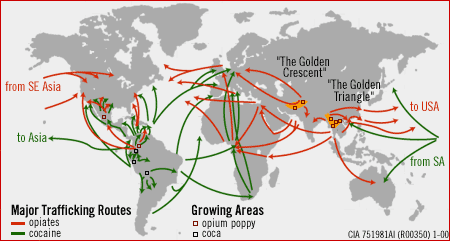Rio de Janeiro
Av. Presidente Wilson, 231 / Salão 902 Parte - Centro
CEP 20030-021 - Rio de Janeiro - RJ
+55 21 3942-1026

What are drug mules?
Mule is the person used by traffickers to transport illegal drugs across policed borders, for payment or coercion.
The foreseen penalty is 5 to 15 years of imprisonment and payment of a fine of 500 to 1500 fine days. The same rule, in its article 28, provides for the illicit conduct of carrying drugs for own consumption. However, it is considered a less serious offense and does not provide for a penalty of detention or imprisonment.
Drug trafficking moves between US $ 400 billion and US $ 500 billion worldwide, according to the UN (United Nations).
When we talk about drug trafficking, the term “mule” refers to the individual who, consciously or not, transports drugs in his body, usually to other countries. In more extreme cases, in holes, or even through ingestion of the drug, encapsulated or in the form of packages, wrapped with plastics.
In several cases, the person with low purchasing power, with several debts, is subjected to this situation due to a supposed financial need - although there are several ethical ways to guarantee survival. In others, greed screams loudly, and people like Miss Mexico Laura Zúñiga, face the proposal in search of easy money.
For large traffickers, using this type of “labor” is advantageous for removing them from inspection, for involving people who generally do not raise suspicions and for the fact that, if a mule is arrested, the “financial losses” are less .
The point is that, in addition to the obvious danger of going to jail, mules are subject to a number of unpleasant situations. One is the possibility of becoming increasingly involved in the world of crime; and another situation is the “punishment” by the big traffickers when the combined protocol is not followed (among these, death, usually with cruelty refinements, is a possibility). Being easily dismissed or replaced by the “employer”, or even being denounced by him so that the police get involved with the situation while a much larger load is transported by the same route are also other examples.
Not forgetting the individuals who ingest the drug, who are at serious health risk, considering the high probability that one or more capsules will break in their bodies. In many cases, instant death brings this to an end.
In the case of an offense committed without violence or serious threat, it appears that the risks pointed out to the defendant who is caught for acting as a "mule" in drug trafficking do not require as serious a precaution as the prison if it is proven that he has no experience. offense.
Defendant with financial difficulties agreed to transport drugs and was caught by the police.
With this understanding, the 6th Panel of the Superior Court of Justice upheld the appeal in Habeas Corpus to replace the preventive detention of the defendant who was caught transporting 29 kg of cocaine between Dourados (MS) and Bauru (SP).
The incarceration gave rise to periodic filing in court, a ban on moving without prior authorization, and a ban on having personal contact with people involved in trafficking and other criminal activities.
Rapporteur, Minister Nefi Cordeiro affirmed that, as a rule, the excessive quantity of drugs seized is a concrete motivation for the decree of precautionary arrest, based on dangerousness and social risks. This is not the case for the defendant, however.
At the interrogation, he clarified that he had never been arrested and that he agreed to transport the drugs because he was five months out of college tuition late, in addition to helping his father in the treatment of glaucoma. Thus, it did not appear in the records that he has a criminal experience.
"In this context, in the case of a crime committed without violence or serious threat, it appears that the risks pointed out do not require as serious a precautionary measure as prison, in view of the current situation of the pandemic caused by Covid-19 and the circumstances of the case as this is a primary patient with no history, he concluded.
 Mr. Alessandro Jacob speaking about Brazilian Law on "International Bar Association" conference
Mr. Alessandro Jacob speaking about Brazilian Law on "International Bar Association" conference Av. Presidente Wilson, 231 / Salão 902 Parte - Centro
CEP 20030-021 - Rio de Janeiro - RJ
+55 21 3942-1026
Travessa Dona Paula, 13 - Higienópolis
CEP -01239-050 - São Paulo - SP
+ 55 11 3280-2197